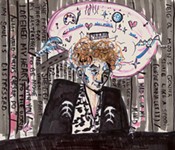Goodbye, Goodness
Sam Brumbaugh
Reviewed by Shawn Badgley, Fri., April 29, 2005

Goodbye, Goodness
by Sam Brumbaugh
Open City, 278 pp., $13 (paper)
There should be a moratorium placed on any mention of Ferris wheels in fictions about people in their late teens or twenties. A description of the sunset should never be aided by the adverbial form of "flamboyant." Never. And, within a first-person point of view, the narrator cannot describe a dream, wake up, and inform the reader that he does not remember the dream. Aside from these minor annoyances and the occasional overwrought outburst that finds nothing but trouble in groping for continuity of tone with the air of detachment in this formidable debut, Sam Brumbaugh's Goodbye, Goodness is, when all is said and done – and by the time its conclusion coils around on the novel with a suffocating, albeit strangely refreshing force, the reader feels as if all has indeed been – a good story by a born storyteller.Told in the cracks between bicoastal flashbacks and Nineties real time by Hayward Theiss, a twentysomething working in television, it's the story of someone who can only move forward by retracing his steps and fulfilling – or conquering – his need to go back. Along the way, we run into Will and Kimmel, friends of Hayward's from his school days. Will is a driven magazine journalist whose boarding-school residue – drugs, entitlement, expensive tastes, and reckless addiction to acceptance – won't wash off. He and Kimmel – a moody indie rocker (write what you know, right?: Brumbaugh's two decades' experience in the music business establishes itself all over the place in this semiautobiography) whose development during the course of the novel is most notable despite the fact that he seems to float on its periphery – were friends before meeting Hayward, and they share a certain private dynamic that eventually becomes destructive.
"With Kimmel, I soon learned, there was always at least one layer of faking," Hayward tells us. "I noticed a book sticking out of his shoulder bag: Memoirs of a Fox Hunting Man," while Will, on a book tour, "stood, went over to a life-size cardboard promotional placard of himself. He picked the placard up, took it up to the tiny stage, and propped it up behind the microphone."
Symbolism aside, these are people finding out they have no idea who they are after having been convinced for years. Hayward himself stands in the "safety lane of the highway" at the novel's outset, and he has holed up in an abandoned Malibu beach house to tell his story, battered and rudderless after months of good, bad, and ugly decisions. As he recovers, he thinks often of his family, of his father, of his institutionalized ex-girlfriend (of course), of Will and Kimmel, of his maybe great-grandmother Annie Oakley. Here, the legendary sharpshooter is reduced to anecdotal chunks dropped throughout Goodbye, Goodness. The author is apparently actually related to her, and his use of her memoirs is both admirable and initially off-putting, as are, in turn, several references to Sitting Bull and Buffalo Bill. Growing up, like settling the West, I guess, is hard to do. Both go from innocent to sinister pretty quick. Even so, Kimmel tells Hayward, "Youth, you know, is mostly an extremely misconceived race. You go so hard, you don't realize you have all this time at the end."
What considerable wisdom Goodbye, Goodness possesses isn't found within that revelation, but rather, often, in the way that its characters talk, the way they interact in response to what happens around them. The way life happens amid it. The novel doesn't pretend to be anything all that new, but it's artful in its own right, and Brumbaugh's voice is solid and assured, learned and lean, accustomed to telling stories. "I remember looking at her and thinking eyes are hours and hours are jewels of light," Hayward recalls of Will's girlfriend, Reina. It's a sentence that's a story in itself, heartfelt and lingering. Later, Reina perhaps repays the mystical, unspoken observation with this advice: "There are small things deep in the past you've done, that even if you've forgotten about, people still love you for." For Brumbaugh, whose fiction will only get better, Goodbye, Goodness will be one of them.
Sam Brumbaugh, who also served as a producer on Margaret Brown's Be Here to Love Me: A Film About Townes Van Zandt, will be at BookPeople on Friday, April 29, 7pm.










